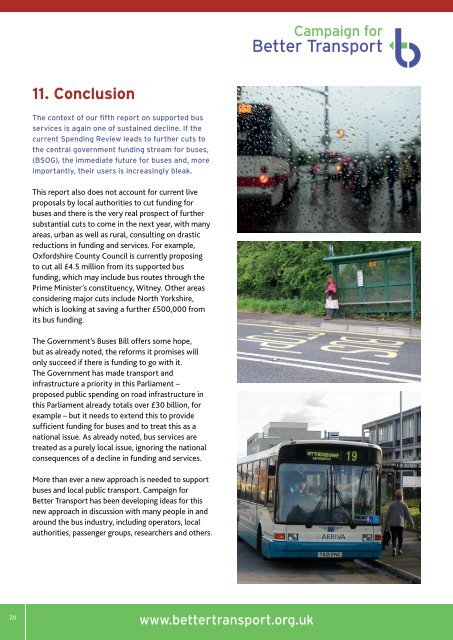Create successful ePaper yourself
Turn your PDF publications into a flip-book with our unique Google optimized e-Paper software.
11. Conclusion<br />
The context of our fifth report on supported bus<br />
services is aga<strong>in</strong> one of susta<strong>in</strong>ed decl<strong>in</strong>e. If the<br />
current Spend<strong>in</strong>g Review leads to further cuts to<br />
the central government fund<strong>in</strong>g stream for buses,<br />
(BSOG), the immediate future for buses and, more<br />
importantly, their users is <strong>in</strong>creas<strong>in</strong>gly bleak.<br />
This report also does not account for current live<br />
proposals by local authorities to cut fund<strong>in</strong>g for<br />
buses and there is the very real prospect of further<br />
substantial cuts to come <strong>in</strong> the next year, with many<br />
areas, urban as well as rural, consult<strong>in</strong>g on drastic<br />
reductions <strong>in</strong> fund<strong>in</strong>g and services. For example,<br />
Oxfordshire County Council is currently propos<strong>in</strong>g<br />
to cut all £4.5 million from its supported bus<br />
fund<strong>in</strong>g, which may <strong>in</strong>clude bus routes through the<br />
Prime M<strong>in</strong>ister’s constituency, Witney. Other areas<br />
consider<strong>in</strong>g major cuts <strong>in</strong>clude North Yorkshire,<br />
which is look<strong>in</strong>g at sav<strong>in</strong>g a further £500,000 from<br />
its bus fund<strong>in</strong>g.<br />
The Government’s <strong>Buses</strong> Bill offers some hope,<br />
but as already noted, the reforms it promises will<br />
only succeed if there is fund<strong>in</strong>g to go with it.<br />
The Government has made transport and<br />
<strong>in</strong>frastructure a priority <strong>in</strong> this Parliament –<br />
proposed public spend<strong>in</strong>g on road <strong>in</strong>frastructure <strong>in</strong><br />
this Parliament already totals over £30 billion, for<br />
example – but it needs to extend this to provide<br />
sufficient fund<strong>in</strong>g for buses and to treat this as a<br />
national issue. As already noted, bus services are<br />
treated as a purely local issue, ignor<strong>in</strong>g the national<br />
consequences of a decl<strong>in</strong>e <strong>in</strong> fund<strong>in</strong>g and services.<br />
More than ever a new approach is needed to support<br />
buses and local public transport. Campaign for<br />
Better Transport has been develop<strong>in</strong>g ideas for this<br />
new approach <strong>in</strong> discussion with many people <strong>in</strong> and<br />
around the bus <strong>in</strong>dustry, <strong>in</strong>clud<strong>in</strong>g operators, local<br />
authorities, passenger groups, researchers and others.<br />
12. Recommendations<br />
The <strong>Buses</strong> Bill<br />
As already noted, the Government promises reform<br />
of the bus <strong>in</strong>dustry through a <strong>Buses</strong> Bill, expected<br />
to be <strong>in</strong>troduced early <strong>in</strong> 2016. The Bill is <strong>in</strong>tended<br />
to complement the Cities and Local Government<br />
Devolution Bill, which will give new executive powers<br />
to cities like Manchester with the creation of new<br />
directly elected Mayors. Under the <strong>Buses</strong> Bill the<br />
mayors, and other authorities like Cornwall where<br />
devolution deals are agreed, will then have the<br />
powers to implement ‘London style’ franchis<strong>in</strong>g<br />
over local buses.<br />
Franchis<strong>in</strong>g powers<br />
The <strong>Buses</strong> Bill is expected to have a central focus on<br />
provid<strong>in</strong>g franchis<strong>in</strong>g powers for local authorities, so<br />
they can plan networks properly and <strong>in</strong>troduce simple,<br />
unified fares structures. The Department for Transport<br />
(DfT) is consult<strong>in</strong>g on giv<strong>in</strong>g local authorities a<br />
wide range of tools to achieve these ends, <strong>in</strong>clud<strong>in</strong>g<br />
strengthen<strong>in</strong>g partnerships (see below), but the <strong>Buses</strong><br />
Bill should also <strong>in</strong>clude the ability to franchise services<br />
where the authority judges that this is the best<br />
way to achieve this. Franchis<strong>in</strong>g need not be solely<br />
the London ‘gross cost’ model, but can encompass<br />
other approaches <strong>in</strong>clud<strong>in</strong>g ‘net cost’ tender<strong>in</strong>g with<br />
stronger operator <strong>in</strong>volvement.<br />
Strengthen<strong>in</strong>g partnerships<br />
Reform to bus services does not always require new<br />
legislation and there are many examples of bus<br />
operators and local authorities work<strong>in</strong>g very well<br />
together (see Nott<strong>in</strong>gham City Council case study<br />
page 14). In many areas passengers and communities<br />
are frustrated that simple, but important<br />
improvements such as simplified fares structures<br />
(multi operator and multi modal ticket<strong>in</strong>g), better<br />
market<strong>in</strong>g of public transport networks as a whole<br />
and better and longer term plann<strong>in</strong>g of networks are<br />
tak<strong>in</strong>g too long to be <strong>in</strong>troduced.<br />
Franchis<strong>in</strong>g may not be the desired model for bus<br />
service delivery <strong>in</strong> all areas and that’s why it’s<br />
important for the <strong>Buses</strong> Bill to also strengthen<br />
regulation around partnerships. The DfT is suggest<strong>in</strong>g<br />
this could be done by devolv<strong>in</strong>g bus registration<br />
powers from Traffic Commissioners to local<br />
authorities, and also some competition powers.<br />
This would have the benefit of br<strong>in</strong>g<strong>in</strong>g together the<br />
different regulations govern<strong>in</strong>g bus services so the<br />
local authority can, for example, apply specific criteria<br />
to the grant<strong>in</strong>g of registrations such as participation<br />
<strong>in</strong> multi operator smart ticket<strong>in</strong>g.<br />
Rural areas<br />
While this bill has a focus on urban areas, rural areas<br />
that have been hit hard by cuts to supported bus<br />
services must also benefit from it.<br />
One approach for the <strong>Buses</strong> Bill to help rural bus<br />
services would be to require local authorities to<br />
conduct effective assessments of need for public<br />
transport <strong>in</strong> their areas. Many local authorities<br />
are simply not do<strong>in</strong>g this, mean<strong>in</strong>g that when<br />
withdrawals of tendered services are implemented<br />
often whole communities are be<strong>in</strong>g cut off. Such<br />
a requirement for authorities to show they have<br />
considered this need will then ensure there is better<br />
strategic plann<strong>in</strong>g of tendered services and will allow<br />
a broader view than simply focus<strong>in</strong>g on short term<br />
metrics like the cost of subsidy per passenger.<br />
The <strong>Buses</strong> Bill is due to be published almost exactly<br />
30 years after the 1985 Transport Act de-regulated<br />
buses outside London. This Bill is an opportunity for<br />
bus users to see rapid improvements to their services<br />
and Campaign for Better Transport supports the<br />
development of legislation which will enable this.<br />
20<br />
21<br />
www.bettertransport.org.uk www.bettertransport.org.uk


